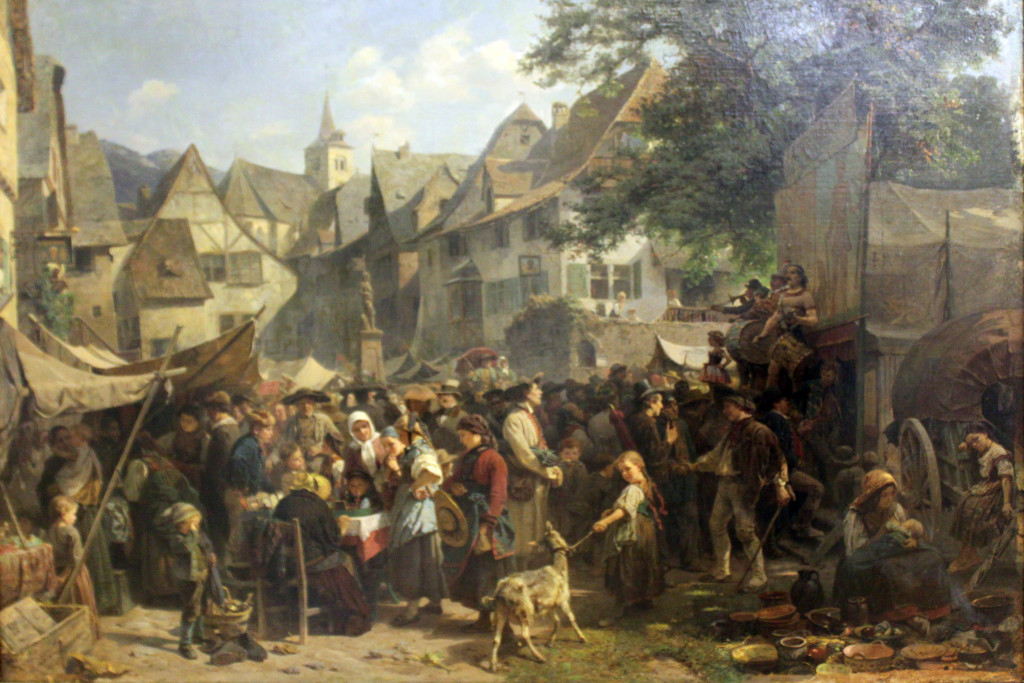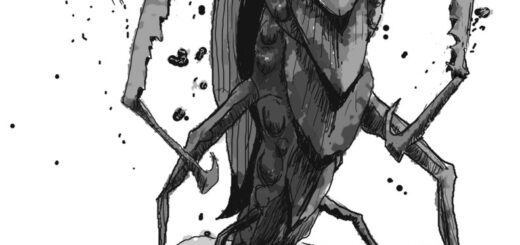Gaining an Edge in the Great Bazaar, Part 1: Knowing Where to Shop

“1881 Vautier Jahrmarkt anagoria” by Benjamin Vautier – anagoria. Licensed under Public Domain via Wikimedia Commons –
Fresh from a lucrative quest and loaded with gold, the adventurers have arrived in a city large enough to handle a thriving market. “I wonder if I can find someone who will sell me a magical shield,” one says, optimistically.
“Not sure if we have enough for that,” replies another, “but maybe we can find some masterwork items that are better than the dented, standard gear we’re carrying?”
Eyes turn to the GM, who sinks a little in her seat.
To the players, a little shopping trip seems like light fare, but to any GM who has tried to handle one, it’s a scenario brimming with anxiety.
The GM is on a tightrope: Give away too much, and you throw off the game balance — and possibly cheapen the sorts of things that might be won through feats of daring. Get stingy, however, and you risk cheapening the coins the party has already earned — the fantasy beer it can buy will never taste as good as what’s actually at the gaming table. Moreover, it’s unrealistic to imagine a grand bazaar in a fantasy world that wouldn’t sell magical items. In part, that’s just simple economics — if supply and demand exists, so does a market. But attunement adds another reason: Other adventurers will outgrow items they’re carrying and want to get some value out of them.
You can draw on a previous article in our equipment series on one way to handle “masterwork” items that fill the space between the basic equipment tables and the magic item tables. And tools like that can help you maintain balance a bit when PCs hit the marketplace.
The article below, however, suggests some ways to make the shopping expedition more like an adventure in itself. Below are bargain-hunting challenges, haggling procedures, and marketplace hazards designed to make items acquired through shopping feel more earned. I’ve addressed the main text to players in part because they have a chance to steer these scenarios if they happen to have read this article and their GM has not. The GM might well be grateful!
Dear Adventurer,
Welcome to the Great Bazaar! If you want a good deal on a nifty object in the Great Bazaar, there are several principles to remember:
Knowing Where to Shop.
You need to know where the good stuff is before anyone else recognizes it’s worth bidding on. Assume that for any kind of item you might look for, you’ll have time and awareness to evaluate between 4 and 7 potential vendors. If you sample a good cross-section of the market, your list of stalls to check out might look like this:
- Vendor 1: The Huckster. This adventurer provisioner sells deliberately fraudulent gear that seems extraordinary. He or she might very well offer you a staff of the magi for just 1,000 gp — but it won’t be one.
- Vendor 2: The Junk-Seller. This merchant sells shoddy gear. Some will bluff about the quality. Others will shrug, give you a good price on crappy stuff, and acknowledge that you get what you pay for. The latter aren’t bad folk. They just fill a niche. And they can sometimes be good sources of information. (GMs: You can find some optional rules for shoddy gear here.)
- Vendor 3: The Unreliable Merchant. Most of the items here will be normal stuff and okay, but there may be some quality control issues, represented by a 5-20% chance of shoddy gear that looks better than it is.
- Vendor 4: The Reliable Merchant. The gear here is straight out of the equipment tables.
- Vendor 5: The Reliable, Connected Merchant. The gear here is straight out of the equipment tables. However, the merchant knows where better stuff might be found and may, under the right conditions or for the right person, help introduce that person to the other source (usually a type 6 or 7 below), broker an agreement, or acquire the item for the shopper and then sell it for a commission.
- Vendor 6: The Superior Merchant. Although most of the gear here is normal, the superior merchant has both range and quality control. There’s no junk, but he or she might have an occasional exceptional or masterwork item — sometimes commissioned for another person or kept for sentimental value, and thus sold dearly. The Superior Merchant knows which items on stock are exceptional and will not let good stuff slip away cheaply. That’s one of the side effects of good quality control.
- Vendor 7: The Master Adventurer Provisioner. This reliable adventurer provisioner trades carefully selected, extraordinary, often unique gear. What she has may vary by the week. What she doesn’t have, she might be able to find (like vendor 5 does). Sometimes she has her inventory on hand. Other times, what she really has is a list of items she knows she can get her hands on, so the exchange follows this pattern: You say what you want, she makes sure you can afford it, she digs up a specimen or two, and then you meet again so you can check it out and buy it.
When you start evaluating them, you won’t know which of the vendors you’re considering is type 7 and which is type 1 — and it’s possible you will have overlooked type 7 entirely. They’re easy to miss, in part because they don’t always advertise themselves. An observant shopper will spot more contenders and have a better range of options to choose from.
Although you can try relying on your own eyes and ears (using Perception and Investigation), having better connections than others have can give you an edge — and if you don’t already have those connections, you might be able to establish some by leveraging existing contacts and using Persuasion. As long as you’re sure you can trust your contact or guide, you may be able to avoid some of the pitfalls of the large market.
While you’re on your own, though, the following skills will be highly relevant to your market quest:
- Perception: DC 15 permits you to notice vendors who might otherwise be overlooked — sellers who might only open for a few minutes and sell out quickly, or sellers who keep their best wares hidden from view. With a 15 or higher, you’ll notice seven merchants relevant to your quest — including some quiet ones. You won’t know which is which type yet, but you’ll at least have a shot at talking to types 6 and 7. Failure means you’re aware of just six vendors. (Expect the GM to roll 1d6 on the list above, and you won’t have a shot at type 7.) A fumble means you’re only aware of four vendors. (Expect the GM to roll 1d4!) That’s because types 1 through 4 are often the ones most likely to talk to you as you pass by and they’re the ones the street urchins are most likely to drag you to if you ask around. If you’re a local, a rogue, or have relevant manufacturing background (smithing, for instance, if looking for metalwork), you can roll this check with Advantage.
- Insight: You can roll this check each time you stop by a vendor to scope him out. A DC 15 check reveals what kind of people are browsing there or talking to the vendor. Are they local? Are they experienced bargain hunters or amateurs? Do they seem to know and trust the vendor or are they strangers to him or her? Beating DC 15 means you can rely a bit on the instincts of the other shoppers — if the people crowding the stall seem to be out-of-town amateurs, you might move along to the next option. Insight can also be used to read the merchant (DC 20), but this is a much less reliable option — the best hucksters are good because they can hide their dishonesties. If the character is a bard, rogue, proficient in Deception, or member of a relevant artisan guild or profession, the check can be rolled with Advantage.
- Hidden merchandise: Some merchants will have their best stuff in safekeeping, hidden from view. Generally, the stuff on display will still be good (they have a reputation to uphold), but they don’t want to encourage robbery. Items on the hidden market are often expensive; sometimes the merchant is reluctant to part with them. See “Hidden Market” below for how to handle such exchanges.
- GM role-playing note: As noted earlier, hucksters and unreliable merchants are more likely to try to get the attention of passers-by, while the most reliable and solid sources are likely to focus on their work, assuming business will come. Give these cues to players without them having to roll for them. Savvy players may not feel the need to check.
- Investigation: A DC 15 check reveals the general quality of the equipment available for viewing or handling. If you are proficient in the type of equipment (or in the tools used in making it), you can include your Proficiency Bonus in the check. If you are proficient in both the equipment and in Investigation, roll with Advantage. This is where being a sword expert helps in evaluating blades, or being an expert on horses helps you buy a horse. Note that this investigation process is slower than some of the options above. While you’re checking out a bogus sword, the person who reads the crowd around your booth might move onto the good stuff and beat you to it! It’s also more limited: You might only evaluate what’s on display and miss the social clues that indicate the seller has better items not on display. Note: If the facility where items are actually manufactured is visible, a character with a background related to that kind of production can tell on sight (no roll required) whether the operation is likely to produce quality work.
- Lore: If you have proficiency in Arcana or Religion, a successful check (DC 15) can help you evaluate whether sales lore surrounding unusual devices, magical items, and exotic gear is accurate (DC 15). If you have the sage background or the bard class, you may roll this check with Advantage. Assume a character with the bard class and sage background, or with the bard class and College of Lore, automatically knows such things without rolling, at least for most items that might be found in an exotic market. GMs may want to use the Smarter Intelligence Check rules for this kind of check.
Once you’ve scoped out the market, it’s time to try to make a deal with someone, a subject to be picked up in Part II.
Part II of this article, “Making a Deal,” can be found here.
Part III of this article, “Avoiding Trouble,” can be found here.












